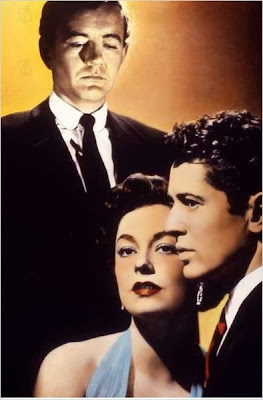Actor Farley Granger died in New York on Sunday at age 85. He'd begun his career in Hollywood under contract to Samuel Goldwyn and made his first film, The North Star, in 1943. Five years later he worked for the first time with Alfred Hitchcock on one of the director's most interesting exercises, Rope (1948), co-starring James Stewart and John Dall. In 1951 he again worked with Hitchcock and it is for this film, Strangers on a Train, that Granger is best remembered. The actor later left Hollywood to work on the New York stage; in 1986 he won an Obie Award for his performance in "Talley & Son." Though Farley Granger is not the specific focus, I'm posting this previously published reflection on Strangers on a Train in tribute to of his life and career.
It was the middle of the 20th Century and Alfred Hitchcock's last major film had been Notorious (1946). Four years and four films later, he seemed to be drifting. Though The Paradine Case, Rope, Under Capricorn and Stage Fright were all interesting attempts, only underrated Stage Fright was successful, but it was not major box office. |
| Hitchcock and Granger on the set |
Raymond Chandler was tapped to tackle the screenplay, though Czenzi Ormonde, a protege of Ben Hecht, rewrote most of it. Cinematographer Robert Burks collaborated with Hitchcock for the first time and earned an Oscar nomination for his efforts. He was nominated again for Rear Window and won for To Catch a Thief. Dimiti Tiomkin, who had last worked with the director on Shadow of a Doubt, composed the dramatic score. Hitchcock produced and directed for Warner Brothers.
Strangers on a Train (1951) is considered one of Hitchcock's most accessible films; its overwhelming success revived the director's reputation at a crucial point. It also signaled the beginning of his final great filmmaking period.
 |
| "meet cute" moment |
 |
| Farley Granger and Laura Elliott/Kasey Rogers |
Alfred Hitchcock once told Francoise Truffaut, "...the more successful the villain, the more successful the picture. That's a cardinal rule..."
The bold, unforgettable performance of Robert Walker as unhinged Bruno Anthony is proof of that rule. Remarkably, Walker had mostly been cast as boy-next-door types up till then. Like Joseph Cotten's Uncle Charley in Shadow of a Doubt, Walker's Bruno is a glib, self-possessed charmer who is also a remorseless killer. Walker is riveting onscreen. His Bruno is confident, slick, erratic...and very unsettling. His smooth veneer barely masks a simmering rage. With a voice that slides from sensual as velvet to cold and hollow as tin, his eyes glitter, glare, caress.
 |
| Robert Walker |
Walker died tragically at age 32 less than two months after the film was released. He had appeared in more than 30 films in his career, but it was Strangers on a Train that allowed him to reveal the devastating range of his talent.
Farley Granger later reflected, "he was great in the film; his potential was limitless, his career was just beginning to take wing."
Robert Walker's life had been short and often troubled, but it later became clear that he had a bit of good fortune after all; his greatest role, a virtuoso performance, was preserved in one of Alfred Hitchcock's finest and most popular films.
British film critic and historian David Thomson noted in a 1999 Hitchcock centenniel article on Strangers that Walker's was "...a landmark performance. You see it now and you feel the vibrancy of the modernity...he had had that one chance..."











0 comments:
Post a Comment